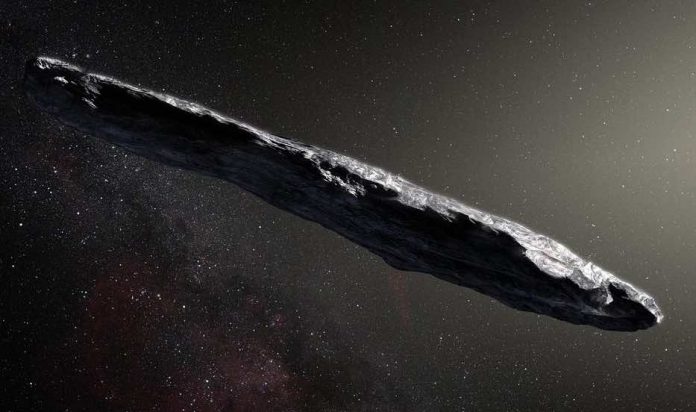2015 BZ509 has been on an unusual, wrong-way orbit since the solar system formed, researchers say.
The mysterious asteroid ‘Oumuamua made headlines last year as the first interstellar object ever detected passing through our little corner of the universe. However, it turns out ‘Oumuamua wasn’t the first interstellar visitor we spotted. It was just the first one we recognized as alien. An asteroid called 2015 BZ509 is currently in orbit close to Jupiter, but it’s orbiting the wrong way. A new study claims this object arrived in our solar system from someplace else and was captured by the sun’s gravity.
Scientists were able to peg ‘Oumuamua as an alien soon after it appeared in the sky. This object was rocketing through the solar system so fast that it could not have possibly originated here. But 2015 BZ509 was a tougher nut to crack. Astronomers first spotted the object in orbit of Jupiter in 2014. They immediately knew this object was unusual because it had a retrograde orbit — that means it orbits in the opposite direction from almost everything else in the solar system. Since orbital direction is a product of the way the solar system formed, this is substantial evidence that 2015 BZ509 comes from someplace else.
It’s not unheard of for objects like asteroids and comets to be thrown into retrograde orbits by collisions or other events. So, astronomers took a closer look at 2015 BZ509’s motion. Jupiter’s extreme gravity tends to deflect small objects into eccentric orbits, but 2015 BZ509 is stable. Astronomers Fathi Namouni and Maria Helena Moreira Morais ran more than one million simulations, and found no plausible scenario in which 2015 BZ509 arrived in its current retrograde orbit if it were born of this solar system.
Because 2015 BZ509 is in a stable orbit, the team was able to “rewind” its calculated orbit into the past. They believe this object arrived in our solar system billions of years ago when the planets were still forming. It may have come from one of the other nearby solar systems that formed around the same time. Those systems have since drifted away, but studying 2015 BZ509 could tell us about their composition.
This discovery, if it’s confirmed by other groups, could encourage scientists to take a second look at other unusual asteroids. Perhaps some of them are also hiding extraterrestrial origins. If we find more objects like 2015 BZ509, we might be able to study other solar systems in our own backyard. ‘Oumuamua was moving so quickly we couldn’t get a good look at it, but 2015 BZ509 isn’t going anywhere.















